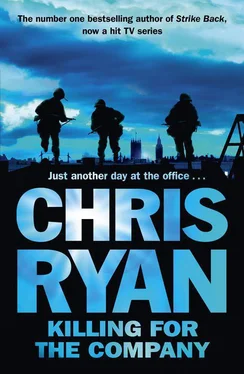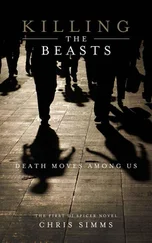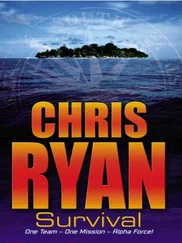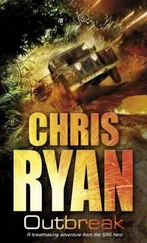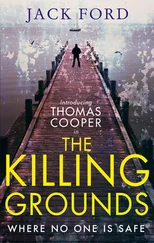Once he was fully naked, she stepped back and examined him. One cut would do it, from the throat, down his abdomen, to the area just above his groin. The knife pierced the skin easily. With the precision of a butcher she sliced his body open in a single movement. Blood seeped from the incision, though not a great deal because his heart was no longer beating. Maya discarded the knife — it had done its work — and then slipped her fingertips into the incision in the belly and ripped the skin apart.
There was a sucking sound as the warm internal organs loosened and spilled out, bringing with them a terrible, rancid smell. The end result was monstrous and Maya, even though her stomach was turned only by the stink and not by the sight, recognised this. She went back to the bathroom for her second shower of the day, leaving bloodied footprints in the carpet as she went.
This time the blood took longer to clean from her skin. The shower ran cold, but she stayed there until the water spiralling around the plughole was no longer pink. When she stepped out, she was covered in goosebumps, so she dried quickly and put on a clean set of clothes, barely glancing at the mutilated corpse on her bed.
It was time to leave. There was nothing she wanted to take with her, except the snubnose, the Beretta and the extra rounds. She would never be returning to this place. She allowed herself one final look at her handiwork. Did it say what she wanted it to say? Did it warn Ephraim Cohen, and the others at the Institute, what would happen to anybody they sent after her?
‘ Ken behekhlet ,’ she muttered to herself. ‘Damn right it did.’
Maya Bloom walked out of the bedroom, descended the stairs and stepped out into the cold night air, closing the front door quietly behind her.
Ten years later, 2013.
5 December.
Reg Parker, the driver of the soon-to-depart 16.55 train from Bristol Parkway to London Paddington, was deeply engrossed in his Daily Express. He had a thing for Kate Middleton and was glad to be alone in the driver’s compartment to lech over the double-page spread plastered with paparazzi shots of her on a beach in Antigua. No sign in the pictures of that chinless wonder Wills, thank God. Just Kate, the sea, the sand and, in his imagination, Reg himself — rubbing factor eight into her back. He looked up in irritation when he heard a tap on the platform-side window.
Some bloody foreigner was standing there, grinning like an idiot. He wore a baseball cap and dark glasses, so Reg couldn’t tell what nationality he might be. Chink, perhaps? He had a camera round his neck, so Reg reckoned he was a trainspotter. Bloody weirdos, the lot of them. He shook his head with irritation, pointed back towards the passenger carriages and went back to his paper.
But the trainspotter didn’t give up. He tapped louder. Reg, irritated now, threw Kate and her sun-kissed skin to one side, and lowered the window.
‘Look, mate, you need to step back from the…’ he said.
He drew breath rapidly. The trainspotter wasn’t smiling any more. And he obviously wasn’t a trainspotter either. As soon as Reg had dropped the window he’d stuck his right hand through the opening. He was holding a gun.
‘You’ve got five seconds to open up.’ The gunman’s accent was heavy and unknown to Reg, who started to tremble.
‘Three seconds.’
Reg fumbled desperately as he opened the driver’s door. The gunman stepped in immediately, pulled the door shut and slid down, with his back against the lower section of the door so he couldn’t be seen from outside.
‘Raise the alarm,’ he said, ‘and I’ll kill you. Do anything except drive off on time and I’ll kill you.’
Reg swallowed hard. He didn’t reply. He couldn’t do anything but stare, petrified, at the weapon in the foreigner’s fist. His own fist scrunched Kate Middleton’s midriff. He was weak with fear and not altogether sure that he wasn’t about to piss himself.
It had puzzled Hussam Hayek, in the weeks leading up to this moment, that trains were not more common targets. Yes, to bring down an aircraft was dramatic. But trains were easy to board and had none of the security restrictions that came with air travel. Unless you were unfortunate enough to encounter a sniffer dog, you’d be practically untraceable on any railway station in the world. And once the train was in motion and between stations, there was little anybody could do to stop you.
The 16.55 to Paddington was in motion and between stations now. One of Hussam’s accomplices, if everything had gone according to plan, had the driver under his control. Surely there was no way anybody could prevent this from happening now.
The train’s five carriages held about thirty passengers each. Men in grey suits and cheap shoes making the journey up to town sat alongside pensioners, mums and a few schoolkids. One blind man had his guide dog sitting in the aisle by his side, his white stick lying at an angle on the table in front of him. The guard had announced just a minute after the train had left the station that no refreshments would be served on this journey, before warning the passengers to be on the lookout for unattended bags or suspicious packages. Hardly anybody listened. They were too wrapped up in their own activities: doing sudokus, texting, listening to iPods.
In addition to the young man who had the driver at gunpoint, there were four accomplices, all male, all nervous, all sweating. Their clean-shaven skin was dark and their eyes brown, but it would be difficult for anyone to tell that they were lifelong residents not of Bristol, nor of London, but of Gaza, that long, thin strip of land sandwiched between Israel, Egypt and the deep blue of the Mediterranean. War-torn. Blood-spattered. Bomb-shattered. Hell by the sea.
Of these four men, Hussam and one other stood at the end of the front carriage, next to the toilets; the other two stood in the same position at the opposite end of the train. All four had known tragedy. Two were orphans before they reached the age of ten, their parents killed by Israeli bombs launched into Gaza from screaming F-16s on the pretext of self-defence. A third had more physical scars: the side of his body bore the lurid traces of a mess of inexpert stitching where a piece of shrapnel had entered. It had been removed, and the wound repaired, without the luxury of anaesthetic or painkillers. He still carried pain with him every waking second, and it was even worse when he tried to piss.
Hussam Hayek was a little older than the other three and they looked to him as a leader on account of this. Two years ago he had become a father, but he only remained so for three days. His wife and baby son had died within an hour of each other — she for want of antibiotics, he for reasons overworked doctors couldn’t fathom. The child’s death was not a surprise to anyone. It was just the way things were in Gaza, its borders blockaded, the importation of medicines strictly controlled. Some entered the country via a smugglers’ route — the subterranean tunnels that ran under the border with Egypt — but these were a precious commodity and never found their way into the hands of poor men like Hussam Hayek.
Small wonder, then, that these four, like many before them, were radicalised beyond the point of return. That hatred was in their DNA. They had nothing to live for.
But they had everything to die for.
Hussam was wearing a Red Hot Chili Peppers baseball cap he’d bought just the day before because he thought it made him look more Western. The rest of their clothes were loose-fitting, but this wasn’t a fashion statement. Beneath their T-shirts and M amp;S raincoats, each man wore a vest packed with acetone peroxide, or TATP. It was a relatively simple explosive to make — all you needed was drain cleaner, bleach and acetone — but the end result was extremely volatile. In Gaza, you could always recognise the TATP engineers. They were the men with missing fingers.
Читать дальше
